Neo Floor to raise surplus worth of rigid core vinyl flooring products
Managed by Pha Le Group, Neo Floor aspires to achieve substantial annual growth in revenue and profits by the end of 2024. This will be accomplished by allocating more than 90 per cent of output to export markets worldwide, with a particular emphasis on the US and the EU. The company holds the belief that the trade dispute between the US and China is unlikely to reach a resolution.
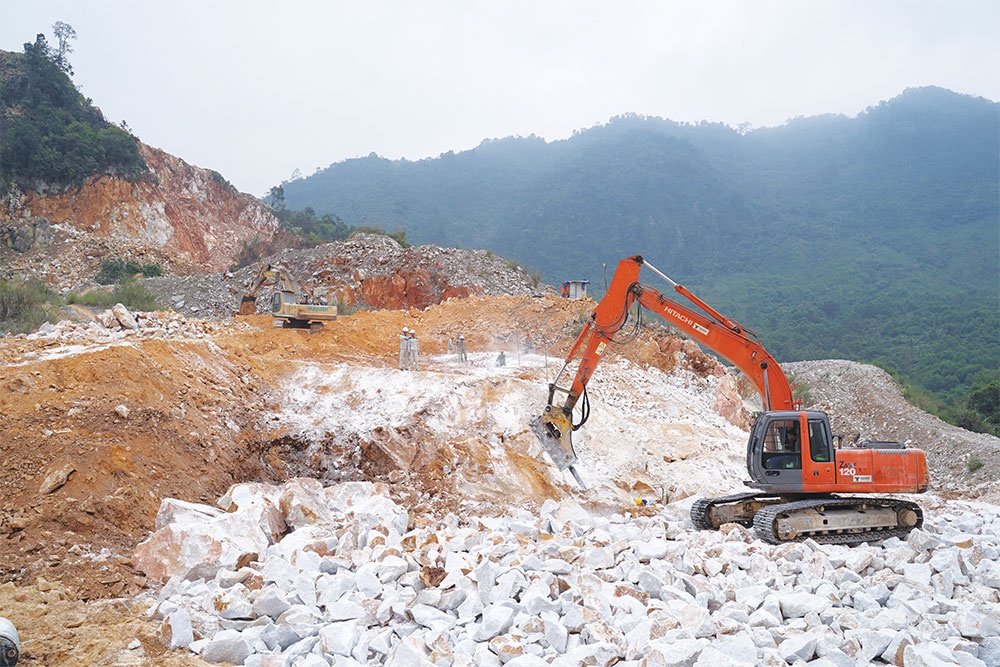 |
However, Vietnamese goods do not incur anti-dumping duties ranging from 8 per cent to 30 per cent on the European market, in contrast to other Asian nations, most notably China. The utilisation of imported input materials in the production of exported products will substantially mitigate the exchange rate risk for the company.
Additionally, the factory of Neo Floor in Haiphong city in the north receives preferential import tax treatment and zero VAT on raw materials imported for export purposes, which further alleviates the company’s financial burden.
Neo Floor’s six mineral mines also under Pha Le Group – two granite mines in Ninh Thuan province, three white marble mines in Nghe An, and one stone quarry in Quang Binh – further contribute to its substantial production volume of about 26 million square metres of rigid core vinyl flooring annually. The CaCO3 mine in Nghe An is widely regarded as a prime source of white and brilliant marble in the world. Spanning an expansive area of more than 10 hectares, its reserves are exceptionally abundant.
CaCO3 stone powder, PVC plastic, and additives are introduced into the extruder under a specific combining formula to make plastic sheets. The wood grain layer is pressed and coated with UV paint using an additional machine system, after which it is cut to the specified dimensions. Five layers are produced in total: after passing the plastic tile panels through a securing press machine, they are transferred to a rubber base layer.
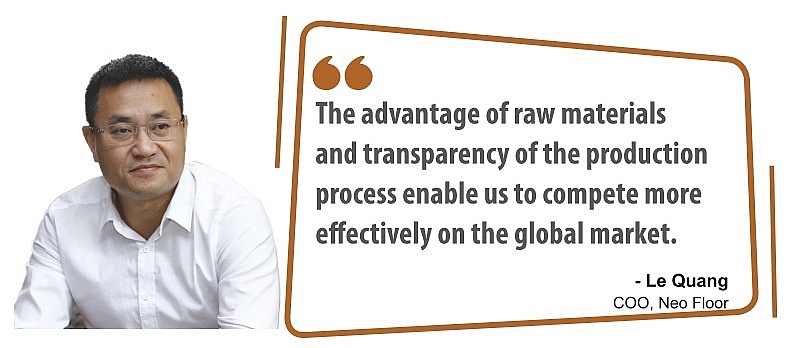 |
“The advantage of raw materials and transparency of the production process enable us to compete more effectively on the global market,” said Neo Floor COO Le Quang.
Neo Floor is investing in advanced exploitation methods and mastering processing technology with the raw materials at hand. Therefrom it can effectively manage product quality to satisfy the needs of domestic and international markets with an annual CaCO3 stone output of 300,000-500,000 tonnes.
Nevertheless, intense competitive pressure compels Vietnamese rigid core vinyl flooring manufacturers to promptly adjust to market conditions, finalise the supply chain, and guarantee origin transparency.
Neo Floor incorporates past experiences into its action plans, recalling a period when the company engaged in the exportation of raw materials extracted directly from quarries. Neo Floor made an investment in a production line for CaCO3 (Filler Masterbatch) additives in 2014. These additives serve as fillers in the manufacturing process of domestic and industrial plastic products.
The primary objectives of the line are to increase product durability, thermal resistance, and cost savings. The company experienced a substantial surge in revenue following the completion and implementation of the Filler Masterbatch production line in the second quarter of 2016. The selling price of this product is 6-7 times that of stone powder products and 13-15 times that of standard CaCO3 stone. The percentage of the firm’s total revenue attributable to Filler Masterbatch sales is rising, from 80 per cent in 2016 to 85 per cent in 2017, and then to about 90 per cent in 2018.
Nevertheless, due to its reliance on imported critical raw materials and its lack of source independence, Neo Floor’s profits are significantly impacted by global plastic resin price fluctuations and exchange rate risks. The Filler Masterbatch is composed primarily of primary plastic granules and CaCO3 stone powder, which together account for approximately 70-85 per cent of the volume.
However, the cost of this raw material is dozens of times bigger than that of the stone powder, resulting in the virgin plastic resin price comprising 55-60 per cent of the cost structure. This factor is beyond the control of the firm and negatively impacted net profit in H2 of 2018.
Neo Floor, whose capacity is approximately 26 million sq.m of floor per year and accounts for nearly half of domestic rigid core vinyl flooring production, seeks to add surplus value to the product by developing consumer goods through the application of technology. Costs and time are reduced through the utilisation of the company’s available conditions for transporting products from the factory to the seaport.
Additionally, the organisation maintains competitive pricing, on-time deliveries, and high-quality products through utilisation of an efficient logistics model and exceptionally qualified staff. Since 2018, 3 per cent of Neo Floor’s annual revenue has been allocated to research and development, in collaboration with eminent doctoral candidates from Hanoi University of Science and Technology, to investigate the applications of CaCO3 in depth.
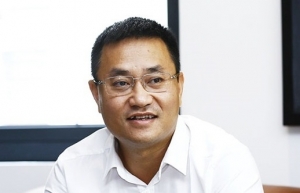 | Substantial funding backs up SPC flooring opportunities Imports of stone-polymer composite (SPC) flooring into the US market has declined, creating an opportunity for non-Chinese manufacturers like Neo Floor. VIR ‘s Van Nguyen discussed this with Neo Floor CEO Le Quang. |
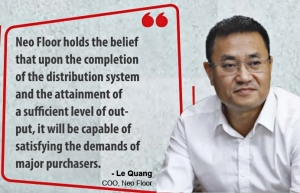 | Neo Floor takes rigid core vinyl flooring onto grand stage with major tie-ups Neo Floor, which has developed a business strategy suited to the new circumstances, has approached and negotiated with major local and foreign distributors to close orders in recent times. |
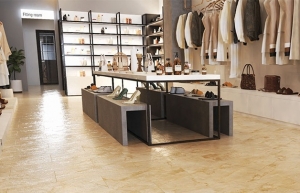 | Digital roadmap prepares Neo Floor for future success While digital transformation may present challenges for some organisations, it enables Neo Floor to actively engage in the global market via e-commerce platforms. VIR’s Angela Nguyen talked to COO Le Quang about its digitalisation strategy. |
What the stars mean:
★ Poor ★ ★ Promising ★★★ Good ★★★★ Very good ★★★★★ Exceptional
Related Contents
Latest News
More News
- Sun Group launches construction of Rach Chiec sports complex (January 16, 2026 | 16:17)
- CEO Group breaks ground on first industrial park in Haiphong Free Trade Zone (January 15, 2026 | 15:47)
- BRIGHTPARK Entertainment Complex opens in Ninh Binh (January 12, 2026 | 14:27)
- Ho Chi Minh City's industrial parks top $5.3 billion investment in 2025 (January 06, 2026 | 08:38)
- Why Vietnam must build a global strategy for its construction industry (December 31, 2025 | 18:57)
- Housing operations must be effective (December 29, 2025 | 10:00)
- Developers that optimise costs will win out in green transition (December 29, 2025 | 09:37)
- Vietnam charts path to mature smart cities with AI at the core (December 26, 2025 | 16:10)
- Three-way partnership unveiled to ease financing at Hong Hac City (December 24, 2025 | 14:13)
- JustCo expands business into Vietnam (December 22, 2025 | 17:58)

 Tag:
Tag:



















 Mobile Version
Mobile Version